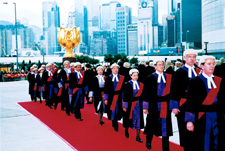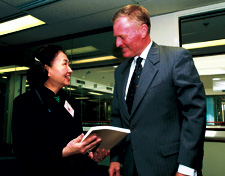 |
It has often been said that if Hong Kong people have a defining ideology, it is the rule of law. That is why, since 1997, the rule of law has been the focus of considerable attention in Hong Kong and for the international community.
Any perceived threats to the integrity of Hong Kong's legal system have been vigorously debated and analysed, as would be expected in a community that places so much trust and importance on the rule of law upheld by an independent judiciary.
Under 'One Country, Two Systems', Hong Kong has retained its common law system, which has continued to thrive and operate normally. The laws previously in force before the Handover in 1997 - the common law, rules of equity, ordinances, subordinate legislation and customary law - have been maintained in accordance with the Basic Law.
The rule of law is one of Hong Kong's greatest strengths. It is the cornerstone of Hong Kong's success as a leading international commercial and financial centre, providing a secure environment for individuals and organisations and a level playing field for business.
Everyone in Hong Kong is equal before the law. Everyone has access to the justice system.
The institutions and core values that underpinned the previous legal system, such as the presumption of innocence, freedoms of expression and association and the right to a fair trial have been retained.
The Secretary for Justice (previously known as the Attorney-General) is the government's chief legal adviser and a member of the Executive Council. The Department of Justice controls criminal prosecutions in the Hong Kong Special Administrative Region free from any interference.
The previous judicial system has been maintained and this has been recognised in many international reports on Hong Kong since the Handover. Judges continue their same common law traditions and exercise judicial power independently, free from any interference.
Access to justice has also been improved: the power of final adjudication is vested in Hong Kong's Court of Final Appeal (CFA), replacing the former role of the Privy Council in London.
The Court of Final Appeal is headed by the Chief Justice, who also heads the judiciary. The Court of Final Appeal is a collegiate court of five judges, comprising the Chief Justice, three permanent judges and one non-permanent judge.
A pool of non-permanent Hong Kong judges and non-permanent judges from other common law jurisdictions may be invited to sit on the Court. This allows the CFA to tap the expertise of the judges and maintain close links with other common law jurisdictions. At present, nine highly-respected overseas judges may be called on to sit on the full bench of the CFA.
Hong Kong's legal profession includes more than 4 700 solicitors and 620 local law firms, more than 750 barristers, 520 registered foreign lawyers and about 45 foreign law firms.
 |
These cases resulted in two Court of Final Appeal (CFA) decisions delivered on January 29, 1999. These decisions set in motion a number of other legal challenges on the issue.
The January 1999 decisions gave the right of abode to two categories of people whose right of abode claims had not previously been recognised. Significantly, that CFA judgment also held that all claimants who arrived in Hong Kong after July 10, 1997, had to make their Right of Abode applications from the Mainland and could be removed from Hong Kong if they entered or remained before their applications had been processed and their status confirmed.
The government requested the State Council to seek an interpretation from the Standing Committee of the National People's Congress (NPCSC) on the true legislative intent of the Basic Law articles in question.
Under the Basic Law, the CFA has the power of final adjudication while the NPCSC has the power of final interpretation of the Basic Law. In keeping with common law tradition and Basic Law provisions, the government did not seek to overturn the effect of the January 29 ruling on the parties to that case.
On June 26, 1999, the NPCSC issued an interpretation of the relevant Basic Law provisions. This interpretation has since been followed by the courts in other cases dealing with the right of abode matter.
The NPCSC's interpretation stated that only children whose parents were Hong Kong permanent residents at the time of their birth were entitled to the right of abode. This is in keeping with international practice. Few countries, if any, allow immigrants to pass on their right of abode to children born elsewhere before they themselves have acquired that right.
The government's decision to seek an interpretation was not without controversy, prompting some to comment that the CFA's authority had been undermined. But in a subsequent right of abode ruling in December 1999, the CFA confirmed that the NPCSC interpretation was both lawful and constitutional. The rule of law and the independence of the judiciary had not been undermined.
Understandably, the issue has generated considerable debate - often emotive - because most cases involve family reunion.
When asked in a recent newspaper article (South China Morning Post, June 14, 2002) whether the referral had humiliated the court or diminished its authoity, the Chief Justice of the Court of Final Appeal, Mr Justice Li replied: "I did not feel any of those things."
Further cases may still be brought to the courts but these are now likely to focus on particular facts of each case rather than matters of basic principle which have so far been the focus of litigation.